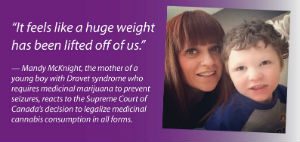By Deron Hamel
The Supreme Court of Canada’s landmark decision to legalize all forms of consumption of medicinal marijuana means Mandy McKnight no longer has to break the law in order to stop her young son’s seizures.
 Mandy’s seven-year-old son, Liam, has Dravet syndrome, a severe form of epilepsy with frequent, prolonged, drug-resistant seizures. He has had a licence to use medical marijuana to treat his epilepsy since he was five. Liam had been having nearly 70 seizures per day.
Mandy’s seven-year-old son, Liam, has Dravet syndrome, a severe form of epilepsy with frequent, prolonged, drug-resistant seizures. He has had a licence to use medical marijuana to treat his epilepsy since he was five. Liam had been having nearly 70 seizures per day.
Since Liam began the treatment, his seizures have been reduced by 90 per cent, and his quality of life has been greatly improved, Mandy says. Today, the only medical treatment he receives is coconut oil enriched with cannabidiol (CBD), a substance derived from the marijuana plant. CBD is the most abundant, non-psychoactive chemical compound in cannabis.
Aside from experiencing significantly fewer seizures, Liam is also sleeping better and has no behavioural issues. He has been gradually weaned off his other anti-seizure drugs and is no longer dealing with the side effects of those medications.
However, until now, the only legal way to ingest medicinal marijuana was through smoking or vaporizing the plant it in its dry-leaf form – which is not a process that’s palatable for a young child.
The McKnight family receives Liam’s prescription of dry marijuana which Mandy mixes with coconut oil in a crockpot. A sample of the cannabis-enriched oil is then sent to a laboratory in British Columbia where it is analyzed to determine the CBD and THC content.
Based on the results, the McKnights determine the correct dosage which they then administer to Liam in a solid form which he eats with his meals.
This process was technically illegal, so the Supreme Court’s unanimous June 11 ruling comes as a huge relief to Mandy and her family.
“The fact that we have not got that hanging over our heads right now is just incredible – it feels like a huge weight has been lifted off of us,” Mandy tells Voices of Epilepsy.
In its ruling, the Supreme Court said that prohibiting “non-dried forms of medical marijuana limits liberty and security of the person in a manner that is arbitrary and hence is not in accord with the principles of fundamental justice.”
While the McKnights are relieved with the Supreme Court’s ruling, there are still grey areas of the law that need to be clarified, Mandy says.
For instance, under the court’s decision it’s legal for people with prescriptions to consume medicinal marijuana in all forms, but the law is not clear on who can produce and distribute it.
Mandy also underscores the importance of patients who use medicinal marijuana to have direction from their doctor.
“I think it’s important to have medical guidance – you really are on your own when it comes to this treatment,” she says. “It’s a broad range of what’s available in terms of strains (of medicinal marijuana) and terms of dosing the cannabis and the interactions with other medications. It’s really important to have that medical knowledge and the guidance of a doctor.”
If you have feedback on this story, or have a story of your own that you would like to share, please contact the newsroom at 800-294-0051, ext. 23, or e-mail deron(at)axiomnews.com. You can also leave a comment below.





